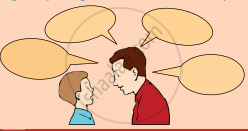Advertisements
Advertisements
Question
Explain the following line briefly with reference to the context.
“Is second childishness and mere oblivion;
Sans teeth, sans eyes, sans taste, sans everything.”
Solution
- Reference: These lines are from the poem ‘All the world’s a stage’ written by William Shakespeare.
- Context and Explanation: The poet says this while the man gets ready to leave this world (i.e.) the last stage of his life on this lonely planet. In this stage, man becomes totally forgetful. He loses his teeth, eyesight, and taste. He loses all his senses of perception. Like a baby, he can’t do anything on his own. So, the poet calls this stage “second childhood” when the old man behaves in a childish manner.
APPEARS IN
RELATED QUESTIONS
Fill in the following empty boxes.
| Name | Location |
| Fort St. George | Chennai |
| Gingee Fort | ______ |
| Golconda Fort | ______ |
| Red Fort | ______ |
How long had the soldiers been in the castle?
Why were the soldiers in the castle fearless?
Where were the enemies?
Read the given line and answer the question that follow in a line or two.
A foothold there, no clever trick
Could take us dead or quick,
Only a bird could have got in.
- What was challenging?
- Which aspect of the castle’s strength is conveyed by the above line?
Read the given line and answer the question that follow in a line or two.
| Oh then our maze of tunneled stone Grew thin and treacherous as air. The castle was lost without a groan, The famous citadel overthrown, |
- Bring out the contrast in the first two lines.
- What is the rhyme scheme of the given stanza?
Identify the figure of speech used in the following line.
Our only enemy was gold,
Describe the garden during the night.
What has Wordsworth sanctified in his poem?
To whom does Toru Dutt want to consecrate the tree’s memory?
Discuss with your partner the different stages in the growth of man from a new born to an adult

Read the given line and answer the question that follow.
And then the justice,
In fair round belly with good capon lin'd,
With eyes severe and beard of formal cut,
Full of wise saws and modern instances;
- Whom does justice refer to?
- Describe his appearance.
- How does he behave with the people around him?
- What does he do to show his wisdom?
Complete the table based on your understanding of the poem.
| Stage | Characteristic |
| crying | |
| judge | |
| soldier | |
| unhappy | |
| second childhood | |
| whining | |
| old man |
‘Ulysses is not happy to perform his duties as a king.’ Why?
Who does the speaker address in the second part?
Why did Ulysses want to hand over the kingdom to his son?
How would Telemachus transform the subjects?
In what ways were Ulysses and his mariners alike?
Explain with reference to the context the following line.
I am become a name; For always roaming with a hungry heart
Explain with reference to the context the following line.
How dull it is to pause, to make an end,
To rust unburnished, not to shine in use!
Explain with reference to the context the following line.
To follow knowledge like a sinking star,
Beyond the utmost bound of human thought.
Every parent is anxious about the welfare of his/her children. Parents express their anxiety by advising them almost all the time. What kind of advice do you frequently receive from your parents? Fill in the bubbles. Tick the ones you like to follow implicitly and give reasons for the ones you don’t like to follow.

Why does the poet advise his son to have lazy days?
Pick out the alliterated words from the poem and write.
And this might stand him for the storms
Explain the following line with reference to the context.
Yet learning something out of every folly
hoping to repeat none of the cheap follies
Explain the following line with reference to the context.
Brutes have been gentled where lashes failed.
Explain how the poet guides his son who is at the threshold of manhood, to face the challenges of life.
Why did the rider keep his lips compressed?
Literary Devices
Mark the rhyme scheme of the poem. The rhyme scheme for the first stanza is as follows.
| With neck out-thrust, you fancy how, | a |
| Legs wide, arms locked behind, | b |
| As if to balance the prone brow | a |
| Oppressive with its mind. | b |
